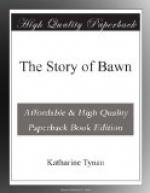“There seem to have been a great many stories,” I said.
“Aye, indeed, so there were, my jewel. There isn’t two you’d meet in the county this minute ’ud hold the same opinion about it. Not but that any way the country people are on the side of Master Luke.”
I was silent for a few minutes, stroking Dido’s silky head, letting her rippled ears fall through my fingers. Her dim eyes were fixed on me with a terrible wistfulness, as though she longed to speak and could not. I felt a great pity for the old dog. What a sad lot is theirs, depending on our presence as they do for the light in their sky, to whom our slightest absence is the absence of death.
“Was nothing ever heard of him?” I asked after that silence.
“Nothing. Some said that he got on board a hooker and was carried to Liverpool and got off to America. Others said the same hooker—she was a stranger in these parts—was swept out to sea and, in the big storm that broke that very week, foundered.”
“It is most likely,” said I, “for if he were living he would never have left them in suspense all these years.”
“There, you’re wrong, Miss Bawn. Master Luke is not dead.”
Dido stirred uneasily and whimpered.
“He’s not dead, Miss Bawn, for if he was dead the banshee would have cried. And the dead coach would have driven up with a rattle and stopped at our door. It never has, Miss Bawn. What you’ve heard has never stopped at our doors. To hear wheels in the distance is nothing. As for the cryin’ in the shrubbery, that is another story. Some day I may tell it to you, child.”
“You have not told me yet,” I said, “why you blame my godmother.”
I had it in my mind that Lord and Lady St. Leger did not blame her, so there could be nothing to blame. It was some stupid and ignorant prejudice of old Maureen’s. I knew she had fostered my Uncle Luke, and that she loved him, as the foster-mother does, with an unreasoning and jealous passion.
Her old lips met tightly.
“Ask Miss Mary herself about that, Miss Bawn,” she said. “No one can say that I am one to talk. After all those years, it would be a pity to spoil all the tellin’ for Miss Mary.”
She sat smiling to herself, a bitter and mocking smile, when she had finished the sentence. I knew Maureen better than to try to win talk from her when she had once made up her mind to silence, so I let her be, only changing the conversation to another subject.
“What will it be like, Maureen, when I am gone?” I asked.
“It will be lonely, Miss Bawn,” she answered; and then, as I had expected, she added, with a little sourness, “Not that you are a patch on Master Luke and Miss Eleanor and your own mother for cheerfulness in the house. Och, the days I could tell of when there was the fine company-keepin’, and the divarsion, and the carriages of the quality drivin’ up to the doors, and the music and the dancin’! Them were the days that were worth havin’, an’ not these days when every one is old—every one but yourself, Miss Bawn; and you’re that quiet that I wouldn’t know you were in the house. Och, the good days! the good days!”




